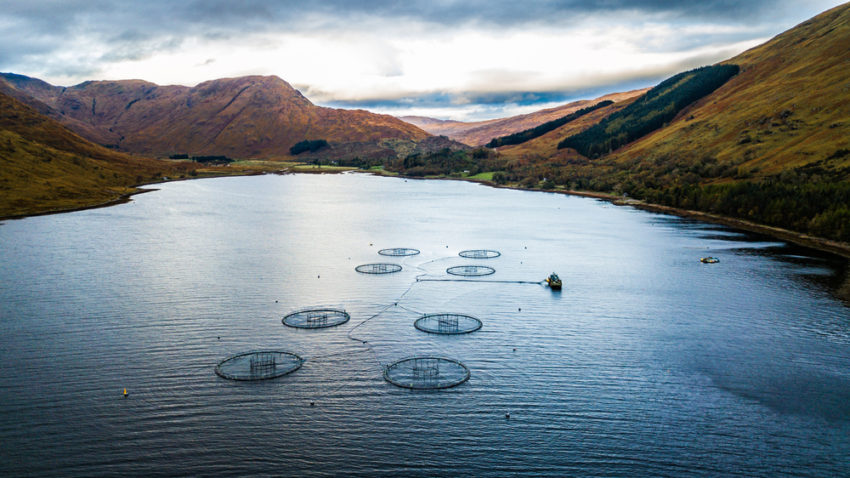Courtesy: FeedbackGlobal.org
The Scottish salmon industry currently uses roughly the same quantity of wild-caught fish to feed its salmon as is purchased by the entire adult population of the UK in one year[i]. And it has plans to grow exponentially, aiming to double in size or more by 2030. A new report by environmental campaign group Feedback estimates that to fuel this ambition, the Scottish salmon industry will need to source 310,000 tonnes more wild fish per year to make into salmon feed, assuming it continues to use the same proportion of wild fish in its feed ingredients[ii].
Fishmeal and fish oil from wild fish, often called ‘forage fisheries’ because they act as forage for a wide variety of other oceanic species, are the cornerstone ingredient in the Scottish salmon industry’s success. Campaigners are concerned that unchecked and under-regulated expansion of the Scottish salmon industry will place severe pressure on wild fish stocks, and the ocean ecosystems and human communities they support, with over 90% of global fisheries already overfished or operating at capacity[iii].
Meanwhile, the Scottish farmed salmon industry is highly wasteful, with around 20% of fish never reaching harvest due to mortalities and escapes during production, according to its own figures[iv]. If this level of waste remains unchecked, a large proportion of the wild fish sourced to feed its salmon is also being wasted.
While some fisheries sourcing wild fish for salmon feed are certified by the Marine Stewardship Council, many are not, or rely on certification by an industry-supported certification scheme, the IFFO Responsible Standard, which certifies fishmeal and fish oil manufacturers, rather than the source fisheries themselves. At a local level in Scotland, several reviews by the Scottish Parliament have raised grave concerns regarding the impact of salmon farming on the Scottish natural environment, including a link to record lows in numbers of wild salmon in Scotland.
Feedback is calling for the Scottish salmon industry to publish full and transparent information about its feed supply chain, including where it is sourcing wild fish, what types of fish it uses, and what proportion of its marine ingredients come from by-catch or trimmings from human edible fish.
Dr Karen Luyckx, Head of Research, Feedback, said:
“The simple reality is that we cannot have our fish and eat it – feeding limited stocks of wild fish to farmed salmon is neither an efficient nor sustainable way to produce protein. We do not accept the industry’s argument that shared use of marine ingredients with other damaging industries such as shrimp and industrial livestock farming as a justification for depleting global fish stocks when we need to urgently check the quantity of animal protein in our diets.
The Scottish salmon industry may like to sell itself as producing healthy and responsible food in a uniquely Scottish wild environment, but with the companies largely Norwegian-owned and the feed coming from all over the globe, the most Scottish part of the industry is the waters these farms pollute and the landscapes they blight. We are very concerned that the despite its claim to ‘responsible growth’ the industry cannot provide the transparency needed to independently verify these far-fetched claims.”
Dr Krzysztof Wojtas, Head of Fish Policy, Compassion in World Farming
“This new report reveals just how unsustainable Scottish salmon farming is and highlights the urgent need for action. It can take hundreds of wild forage fish to produce just one farmed salmon. Not only is this clearly wasteful – it’s incredibly cruel as well.
Salmon suffer when confined in vast numbers, with nothing to do but swim listlessly in circles. And yet, tens of billions of small fish die in inhumane ways on huge industrial fishing vessels, in order to fuel the salmon kept in these underwater factory farms.
It is deeply worrying that the industry expansion has not been stopped in its tracks, considering the huge environmental and welfare concerns. Transparent information about the industry feed supply should be an absolute obligation of this industry.”
John Aitchison, on behalf of the Aquaculture sub-group of the Coastal Communities Network Scotland said:
“This is an industry that markets its fish as responsibly and sustainably produced, and with a low carbon footprint. This report shows that the sourcing of fish for conversion to feed for farmed salmon is far from sustainable at the moment, and now the industry in Scotland wants to double in value by 2030, which is almost equivalent to doubling capacity.
With so many fisheries already operating at or beyond their maximum capacity, where is all the fish meal and fish oil going to come from to feed twice as many farmed salmon, without taking fish from people’s plates in developing countries and further reducing the amount of wild fish available to other species, such as puffins?”
[i] https://www.seafish.org/media/publications/SIF7_FS_March_2017.pdf
[ii] https://feedbackglobal.org/wp-content/uploads/2019/06/Fishy-business-the-Scottish-salmon-industrys-hidden-appetite-for-wild-fish-and-land.pdf
[iii] http://www.fao.org/state-of-fisheries-aquaculture/en/i
[iv] https://www.bbc.co.uk/news/uk-scotland-48266480
Listen to Feedback’s Head of Policy and Communications Jessica Sinclair Taylor interviewed on BBC Radio Scotland (00:48 mins).
